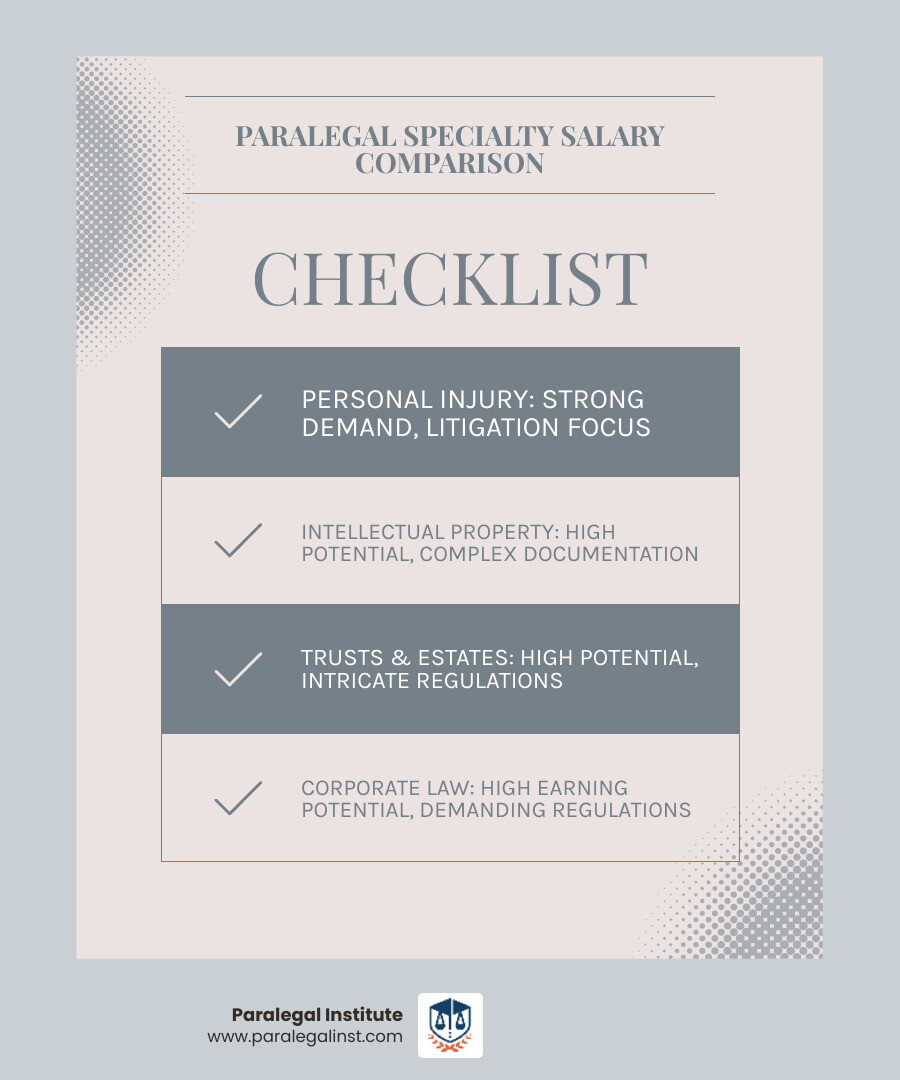Show Me the Money! Personal Injury Paralegal Salary Guide
Your Earning Potential as a Personal Injury Paralegal
Are you wondering how much do personal injury paralegals make? This is a common and important question for anyone considering a career in this dynamic legal field. The good news is, personal injury paralegals can earn a strong income while working in a high-demand area of law.
Here’s a quick look at what you can expect:
- On average, personal injury paralegals earn a competitive annual salary.
- Their hourly wage is typically substantial.
- With experience, many personal injury paralegals achieve higher earning potential, often reaching the top tier of legal support professionals.
This guide will break down the salary landscape for personal injury paralegals. You'll learn about typical earnings, what factors influence your pay, and how your location can affect your take-home money. We will also cover the daily duties and future job outlook for this rewarding role.
This guide helps you understand exactly what to expect. As Matthew Pfau, I've spent years hiring and training paralegals in my law firm, gaining insight into how much do personal injury paralegals make and the skills needed for success. My passion is now training aspiring professionals at Paralegal Institute to launch their legal careers.
Understanding the Personal Injury Paralegal Salary Landscape
When we talk about the legal field, personal injury law truly stands out as a busy and active area. This means there's a steady and consistent demand for skilled professionals who can steer its unique challenges. And guess what? Personal injury paralegals are right at the heart of this demand! They play such a crucial role in helping individuals who are going through tough times, guiding them through the often-complex world of accident and injury claims. Think everything from car accidents to slip-and-falls – they're there every step of the way. This section will dive into the typical earnings for personal injury paralegals, see how they compare to other legal specialties, and show you the fantastic potential for career and salary growth.
How Much Do Personal Injury Paralegals Make Annually and Hourly?
So, the big question: how much do personal injury paralegals make? You'll be pleased to know that personal injury paralegals generally earn a very competitive annual income. This translates to a strong hourly rate, providing a solid financial foundation for a rewarding career.
Now, it's good to remember that these are averages. If you're just starting out, your entry-level earnings might be a bit lower, but think of it as your launching pad! The beauty of this profession is that as you gain more experience, sharpen your skills, and become a true expert, your earning potential can grow significantly. In fact, many of the top personal injury paralegals in the U.S. achieve significantly higher earnings, showcasing a clear and exciting path for salary growth as you become a more seasoned professional.
For an even wider view of the paralegal world, including general salary ranges across the entire profession, you can always check out official data. The U.S. Bureau of Labor Statistics provides comprehensive data on paralegal pay , giving you a great overview of median annual wages for all paralegals and legal assistants.
How Do PI Paralegal Salaries Compare to Other Specialties?
While personal injury paralegals certainly enjoy competitive salaries, it's totally natural to wonder how their earning potential stacks up against other legal specialties. The legal world is vast and varied, with many different areas needing specialized paralegal support. Some practice areas, perhaps because of their unique complexity, the nature of their clients, or the high stakes involved, might offer different compensation levels.
Let's take a general look at how earning potential might compare across various paralegal specialties:

Legal fields like Intellectual Property, Trusts & Estates, and Corporate law often come with higher earning potential. This is usually due to the very specialized knowledge required, the complexity of the cases, or the high stakes involved in corporate transactions.
However, don't underestimate the litigation focus and specialized knowledge that a personal injury paralegal brings to the table. While the general earning potential might appear different at first glance, the market demand for skilled personal injury paralegals remains incredibly strong and consistent. Your expertise in this area is highly valued, and with time and dedication, your income in personal injury law can absolutely grow into a very comfortable living!
Key Factors That Influence Your Earning Potential
When we talk about earning potential as a personal injury paralegal, it’s not just a flat rate. Your salary can be significantly influenced by a blend of factors, including your experience level, your education, the type and size of the firm you work for, and the unique essential skills you bring to the table. Think of it as a recipe for success – the more quality ingredients you have, the better the outcome!
The Impact of Experience and Education on Pay
It probably comes as no surprise that experience plays a massive role in your earning potential. Just like a fine wine, paralegals tend to get better (and more valuable) with age and experience.
- Entry-level roles for personal injury paralegals are where you build your foundational knowledge and develop those crucial practical skills. While starting salaries may be more modest, they are competitive and set the stage for rapid advancement.
- Mid-career advancement usually sees a significant jump in pay as you take on more complex cases, manage larger caseloads, and require less supervision. You're becoming a true asset to your legal team.
- Senior paralegal compensation represents the top tier. These are the professionals who have proven their expertise over many years, often mentoring junior staff and handling the most intricate aspects of personal injury cases. Their deep knowledge and reliability are highly compensated.
Beyond experience, your education provides the essential groundwork. We believe in providing practical, hands-on training that prepares you for immediate workforce entry. Our programs are designed to give you the skills employers are looking for right now. The value of a paralegal certificate from an institution like ours is immense, as it shows employers you have dedicated yourself to learning the specific skills needed to excel in a legal environment.
And the learning doesn't stop once you land your first job! Continuing education opportunities are vital for staying current with legal changes and enhancing specialized skills, which can further boost your earning potential. We offer courses custom to keep you at the top of your game.
How Firm Type and Size Affect How Much Personal Injury Paralegals Make
The environment you work in also plays a significant role in determining how much do personal injury paralegals make. Different types of firms and their sheer size can lead to variations in compensation.
- Plaintiff-side firms typically represent individuals who have been injured and are seeking compensation. These firms often handle a high volume of cases, and paralegals here might work on a contingency fee basis (meaning the firm gets paid if the client wins), which can sometimes influence bonus structures.
- Defense-side firms represent the individuals or entities being sued (e.g., insurance companies, corporations). Work in these firms can be equally demanding but might have different billing structures that affect paralegal pay.
- Boutique law offices are smaller, specialized firms, often focusing exclusively on personal injury. While they may offer a more intimate work environment and broad exposure to all aspects of a case, their salaries might differ from larger firms.
- Large national firms or "Biglaw" typically handle high-stakes, complex litigation and often have higher overheads, but also higher revenue. They generally offer some of the most competitive salaries and comprehensive benefits packages for paralegals, though the work pace can be incredibly demanding.
- Corporate legal departments of large companies might also have personal injury divisions, particularly for worker's compensation or product liability. These in-house roles can offer stable hours and excellent benefits.
- Government agencies sometimes employ paralegals for personal injury cases, such as those involving federal employees or specific types of claims. Government salaries are often standardized based on pay scales.
The role of paralegals in different law firms can vary greatly, and understanding these nuances can help you choose the right fit for your career aspirations and earning goals.
Essential Skills That Boost Your Value
Beyond formal education and years on the job, a specific set of essential skills can make you an invaluable asset and directly influence how much do personal injury paralegals make. These aren't just "nice-to-haves"; they are critical competencies that improve your efficiency, reliability, and ultimately, your earning power.
Here's a list of highly valuable skills for a personal injury paralegal:
- Medical terminology: Personal injury cases are all about injuries! Understanding medical reports, diagnoses, and treatments is absolutely crucial. Without this, you'd be lost in a sea of jargon.
- Insurance policy knowledge: Navigating insurance claims is a daily task. Knowing the ins and outs of various insurance policies, coverages, and claims processes makes you incredibly effective.
- Investigative skills: From interviewing clients and witnesses to digging up facts and evidence, a keen eye for detail and strong investigative prowess are essential. You're part detective, part legal assistant!
- Trial preparation: For cases that go to court, assisting with trial prep is a major responsibility. This includes organizing exhibits, preparing witnesses, and drafting trial-related documents.
- Client communication: You'll often be the primary point of contact for clients. Empathy, clarity, and professionalism in communication build trust and ensure smooth case progression.
- Legal research and writing: The ability to research case law, statutes, and regulations, and then draft clear, concise legal documents (like pleadings, motions, and correspondence) is fundamental.
- Case management software proficiency: Most modern law firms rely on specialized software to manage cases, deadlines, and documents. Being adept at these tools makes you highly efficient.
Cultivating these skills will not only make you more effective in your role but also significantly increase your value to employers, leading to greater career opportunities and better compensation.
How Much Do Personal Injury Paralegals Make Based on Location?
Just like real estate, when it comes to paralegal salaries, location, location, location is key! How much do personal injury paralegals make can vary wildly depending on where you live and work. Geographic pay differences are influenced by several factors, including the local cost of living, the density of law firms, and the overall economic health of a region.
Top Paying States and Metropolitan Areas
If maximizing your earning potential is a top priority, certain areas of the U.S. stand out. Our research indicates that states with a high concentration of legal activity and a higher cost of living tend to offer more competitive salaries for paralegals.
For instance, the District of Columbia frequently leads the pack, followed closely by West Coast salaries in California and Washington. Major city hubs like San Jose-Sunnyvale-Santa Clara, San Francisco-Oakland-Hayward, and Washington-Arlington-Alexandria consistently rank among the highest-paying metropolitan areas for paralegals. New York, particularly New York City, also offers strong earning potential.
While some Southern states and the Midwest might have lower average salaries, it's crucial to consider the local cost of living, which is often significantly lower in those areas. This means your take-home pay might stretch further, even if the nominal salary is less. Our home city of Las Vegas, NV, for example, typically offers salaries that are competitive within the region and reflective of the local economy.
To truly pinpoint what you might earn in your specific area, you can find local salary information with tools like the one provided by CareerOneStop.
Why Location Matters for Your Take-Home Pay
So, why do these geographic disparities exist? It's a mix of economic principles and legal market dynamics:
- Local legal market size: Areas with a larger and more active legal sector, meaning more law firms and more legal work, tend to have higher demand for paralegals, which drives up salaries.
- Concentration of law firms: Cities with many law firms create a competitive environment for talent, compelling firms to offer better compensation to attract and retain skilled paralegals.
- Population density: Densely populated areas often correlate with more legal disputes and, consequently, more work for personal injury paralegals.
- State-specific tort laws: Some states have tort laws that might lead to higher settlements or verdicts in personal injury cases, potentially allowing firms to generate more revenue and, in turn, pay their staff more.
- Economic conditions: The general economic health and cost of living in a region directly impact salary scales. Firms in high-cost areas need to pay more for their employees to afford to live there.
Understanding these factors is key to strategizing your career path, whether you plan to stay local or explore opportunities in other regions. For a deeper dive into employment projections by state, you can check out State-level employment projections from Projections Central.
The Role and Future of a Personal Injury Paralegal

Beyond the question of how much do personal injury paralegals make, lies the heart of the profession: the meaningful work itself. Becoming a personal injury paralegal means stepping into a truly vital role within our legal system. It's a position that offers a wonderful blend of challenge, continuous learning, and the deep satisfaction of helping people steer some of the toughest times in their lives. This section will walk you through a typical day, revealing the responsibilities that make this career so engaging, and then peek into the promising future of personal injury paralegals.
A Day in the Life: Typical Duties and Responsibilities
A personal injury paralegal's day is usually anything but boring! You'll be a key player, assisting personal injury lawyers as they handle claims for injuries or accidents caused by someone else's actions. Whether you find yourself on the plaintiff's side (helping the injured party) or the defense side (representing the party being sued), you'll find unique challenges and rewards every day.
Imagine starting your morning by conducting client intake and interviews. You're often the first friendly face a new client sees, and your compassionate listening and ability to gather initial details about their accident and injuries are absolutely crucial. You'll help them understand the firm's process, setting the stage for their entire legal journey. After that, you might shift gears to case management, which is like being the conductor of a busy orchestra. You’ll organize and maintain all those important legal documents, track deadlines to make sure nothing falls through the cracks, and ensure every aspect of a case moves forward smoothly.
Later in the day, you might dive into drafting pleadings and motions under the careful supervision of an attorney. This means preparing essential legal documents like complaints, answers, interrogatories, and motions – requiring a keen eye for detail and a solid grasp of legal procedures. A big part of personal injury work also involves medical record analysis. You'll spend time reviewing and summarizing medical records to truly understand the extent of a client's injuries and how they've impacted their life. This is where your knowledge of medical terminology really shines! And yes, you'll often be communicating with insurance adjusters, gathering information and presenting claims on behalf of your clients. This requires a firm yet polite approach.
Your inner detective will love the fact-finding process. This involves investigating the circumstances of an accident, researching relevant laws, and gathering all the evidence needed to support the case. Finally, if a case heads to trial, you'll be indispensable in trial support. You'll assist lawyers in preparing for court by organizing exhibits, coordinating witness schedules, and making sure everything is just right for the courtroom. The day-to-day duties are incredibly varied and often challenging, but they are also immensely rewarding. If you're eager to learn how to prepare for an entry-level paralegal job, understanding these core responsibilities is an excellent place to start.
Job Outlook and Career Growth for PI Paralegals
The future is looking quite bright for personal injury paralegals! The demand for skilled legal support professionals, including paralegals, is expected to remain stable and strong. Why? Because the need for legal services across various sectors is simply constant.
The U.S. Bureau of Labor Statistics (BLS) projects steady employment for paralegals and legal assistants. While the overall growth might be described as "slower than average," it’s really important to look at the bigger picture: the sheer number of annual job openings. The BLS anticipates around 37,300 openings for paralegals and legal assistants each year, on average, over the next decade. A large portion of these exciting opportunities come from the need to replace professionals who might move into different careers or retire. This means there's a consistent, healthy demand for qualified individuals like you to step into existing roles.
You might hear whispers about the impact of technology and AI in the legal field. And yes, AI can certainly handle some routine tasks. But here’s the exciting part: this often frees up paralegals to focus on more complex, hands-on roles that truly require critical thinking, sound judgment, and that essential direct interaction with clients—skills that AI simply cannot replicate. So, instead of replacing paralegals, technology is actually making their roles more sophisticated, engaging, and incredibly valuable.
For those eager to climb the career ladder, the personal injury paralegal field offers a clear and rewarding path. You can smoothly transition from an entry-level position to a mid-career role, then advance to become a senior paralegal, taking on more responsibility, leading complex cases, and even mentoring newer team members. Some experienced paralegals can even advance into paralegal manager roles, overseeing entire teams of legal support staff within larger, busy law firms. For the most current and detailed information on the profession's trajectory, we highly recommend checking out the BLS job outlook for paralegals.
Conclusion: Your Path to a Rewarding Paralegal Career
Wow, we've certainly covered a lot of ground today! We dove deep into the question of how much do personal injury paralegals make, and hopefully, you now have a clear picture of the exciting career path this profession offers. It's truly a dynamic field where you can make a real difference.
To quickly recap, personal injury paralegals can look forward to earning a competitive salary. What's even better is the significant potential for your income to grow. This growth often depends on factors like your experience, the education you gain, and even where you choose to live and work.
We've seen that your years on the job really pay off. The more cases you handle and the more you learn, the more valuable you become. Developing specialized skills, like understanding complex medical terminology or knowing how to prepare for a trial, also greatly boosts your value. And remember, the type and size of the law firm you join can also play a big role in your paycheck. Location is another key player, with busy big cities and states known for their busy legal markets often offering higher compensation.
Success in this field boils down to one very important thing: practical skills. Law firms are always looking for people who can jump right in and contribute from day one. They need individuals who have the knowledge and hands-on abilities to immediately help their legal team. And that, my friend, is precisely where our focus lies.
At Paralegal Institute, we are all about giving you the accelerated, hands-on training you need to truly thrive. Our 15-week program was thoughtfully designed by legal professionals who work in the field every day. This means you'll gain the specific, practical skills that employers are actively seeking for immediate workforce entry. We believe in getting you career-ready, and getting you there fast!
If you're feeling excited and ready to fast-track your career into a high-demand, incredibly rewarding profession, we'd love for you to explore all the amazing options waiting for you with us. It's time to begin your legal support staff training and open up your full potential as a successful personal injury paralegal.












